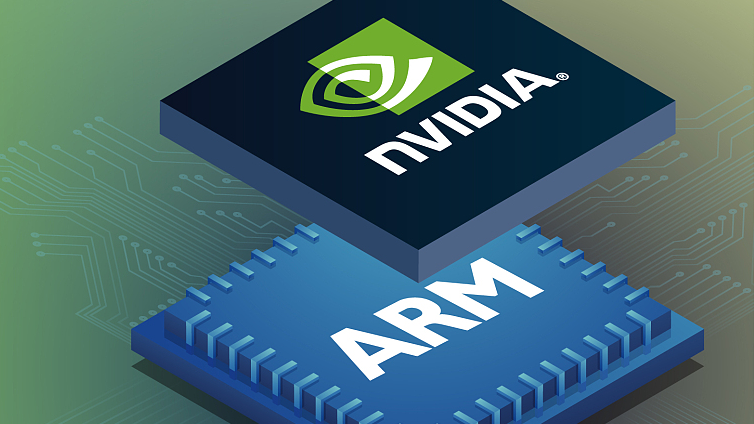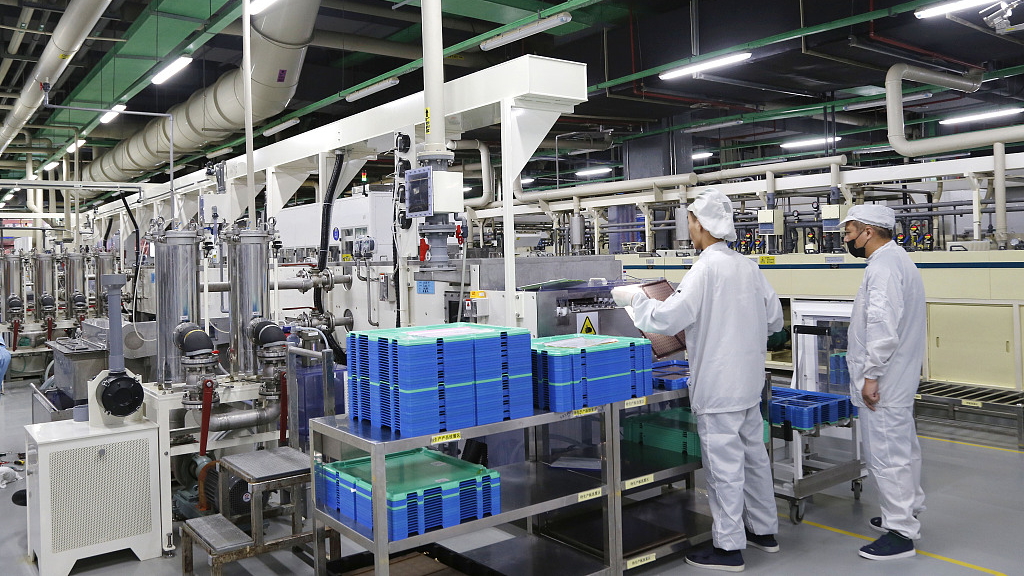
Chip designer Nvidia Corp says that U.S. officials told it to stop exporting two top computing chips for AI work to China, August 21, 2022. /CFP
Chip designer Nvidia Corp says that U.S. officials told it to stop exporting two top computing chips for AI work to China, August 21, 2022. /CFP
The U.S. once again ordered to ban exports of chips to China, this time involving sophisticated chips of graphics processing units (GPUs), insiders said the move is to further restrict China's technological strength.
China, of course, is firmly against such hegemony act, yet the developing country with growing high-tech know-hows and applications in the field is not all pessimistic about the future.
Chip designer Nvidia Corp said on Wednesday that U.S. officials told it to stop exporting two top computing chips for AI work to China. In a filing with the U.S. Securities and Exchange Commission, Nvidia stated that the U.S. government on August 26 informed it about a new license requirement for future exports to the Chinese mainland and the Hong Kong Special Administrative Region (HKSAR) of its A100 and forthcoming H100 integrated circuits.
One day later, it then announced that the U.S. government had allowed exports and tech transfer needed to complete the development of the H100 chip. The U.S. officials also authorized the company to perform exports needed to provide support for U.S. customers of A100 through March 1, 2023, and allowing it to fulfil orders of the chips via its HKSAR facility through September 1, 2023.
Additionally, Advanced Micro Devices (AMD), received new license requirements that will stop its MI250 AI chips from being exported to China, Reuters reported, while the company did not respond to a request for comment on whether it received a similar authorization.

The U.S. restricts exports of two of Nvidia's top computing chips for AI, the H100 and A100, to China, according to a filing, August 31, 2022. /CFP
The U.S. restricts exports of two of Nvidia's top computing chips for AI, the H100 and A100, to China, according to a filing, August 31, 2022. /CFP
China firmly against U.S. chip ban
Chinese Foreign Ministry spokesperson Wang Wenbin said on Thursday at a routine press briefing that the U.S. move is typical "sci-tech hegemony".
"With its technological advantages, the U.S. has been abused the concept of national security and its state power to crack down the development of emerging economies and developing countries," said Wang.
"The move violates market economy principles, harms international economic and trade orders and disrupts the stability of global industrial and supply chains. China firmly rejects it."
Wang also criticizes the U.S. of politicizing, instrumentalizing and weaponizing sci-tech and business issues, engaging in technological blockade to push for decoupling in a bid to monopolize advance technologies and maintain its sci-tech hegemony, and harming close global industrial and supply chains. "Such moves will not succeed."
In addition, Chinese Commerce Ministry spokesperson Shu Jueting said on the same day that U.S. move hurts not only the legitimate rights of Chinese firms but also the interests of U.S. firms. She urged the western country to correct its mistakes immediately and fairly treat companies from all countries, including Chinese companies, so as to do things conducive to global economic stability.

The U.S. latest chip ban involves GPUs, one of the main types of computing technologies, which has been widely used in applications including AI and creative production. /CFP
The U.S. latest chip ban involves GPUs, one of the main types of computing technologies, which has been widely used in applications including AI and creative production. /CFP
Voices from experts
In the 5G era, a stable global supply chain has been maintained before the U.S. disruption moves. The U.S. chip ban this time involved GPUs, one of the main types of computing technologies, which has been widely used in applications including AI and creative production.
The Chinese mainland is the world's largest market for chip products. According to data from industry body Semi, the sales of semiconductor equipment in the Chinese mainland reached $29.62 billion in 2021, up 58 percent year on year, accounting for almost 29 percent of the global semiconductor equipment market.
Experts said the ban is only part of U.S. long-term moves to contain China's technological rise to maintain its hegemony.
"The U.S. latest move targets advanced computing power, which backs AI and supercomputing, and thus will affect China's strategy of channeling more computing resources from the eastern areas to the less developed western regions as well as domestic internet firms engaged in auto-driving and cloud services," said Gu Wenjun, chief analyst at Shanghai-based industry researcher iCwise.
However, Shang Junman, another research analyst from iCwise, said that the banned chips this time are at the top end, thus will have a limited impact on China's domestic companies on the whole.

The Chinese mainland is the world's largest market for chip products. /CFP
The Chinese mainland is the world's largest market for chip products. /CFP
In addition to a crackdown on the Chinese telecom giant Huawei and leading chip manufacturer SMIC, the U.S. further banned ASML's export of extreme ultraviolet lithography (EUV) and older deep ultraviolet lithography (DUV) systems, pressuring South Korea to join its Chip 4 alliance and even enacted the U.S. CHIPS Act on August 9.
The law included a caveat: companies that receive subsidies shall not increase their production of advanced chips in China for 10 years, or else they need to pay back the funding in full.
Gu added that the U.S. may continue to restrict U.S. chip firms from doing business in China, either banning them from enlarging business scale or restricting them from getting jobs there. He said it is quite possible that leading firms in China's chip and internet sectors may face more crackdown from the U.S.

Workers at a chip packaging production line in Nantong City of east China's Jiangsu Province, August 10, 2022. /CFP
Workers at a chip packaging production line in Nantong City of east China's Jiangsu Province, August 10, 2022. /CFP
Future runway for domestic players
Though China is home to a number of startups aspiring to make chips that can compete with Nvidia and AMD, these domestic players only conduct R&D in an early stage. Nvidia still accounts for around 95 percent of China's AI and supercomputing chip market share at present.
Experts noted that U.S.' intensifying crackdown of China's semiconductor sector will force domestic companies to increase exchanges between upstream and downstream firms, accelerating domestic replacement so as to drive up fast-than-expected progress of China's chip industry accordingly.
Chinese companies have been accelerating in making breakthroughs in core technologies.
"For example, Chinese companies used to purchase most of the front-end defect inspection tools from U.S. firm KLA, which accounts for about half of global market share, some domestic firms have now released self-developed prototype machines and some have been producing the tool in a small quantity," Han Xiaomin said.
In addition, local chip industry giants such as National Silicon Industry Group are proceeding with capacity expansions for 12-inch silicon wafers in a bid to improve the country's semiconductor self-efficiency, Han added.

The U.S. latest ban on chip sales to China is to contain the development of China's high-tech sector to maintain its hegemony, said Gu Wenjun, chief analyst at Shanghai-based industry researcher iCwise. /CFP
The U.S. latest ban on chip sales to China is to contain the development of China's high-tech sector to maintain its hegemony, said Gu Wenjun, chief analyst at Shanghai-based industry researcher iCwise. /CFP
Previously, relying on Nvidia's mature ecological software with strong-performance GPU and stable quality, customers seldom considered replacing it with a domestic counterpart.
Nonetheless, looking into the future with an industry already hampered by the U.S., China's domestic players may think twice and seek for other solutions, whether to produce self-developed GPU, or to attain the technology from startups.
Industry experts urged Chinese chip firms to coordinate and increase investment, attracting more top talents to develop the industry in a long-term and sustainable manner.
After all, to achieve technological self-reliance sooner is all good for China's chip industry, isn't it?
Read More:
Exclusive interview: Impacts of U.S. hampering China's chip industry
Ministry: China opposes U.S. 'abuse' of export control measures with latest chips ban

